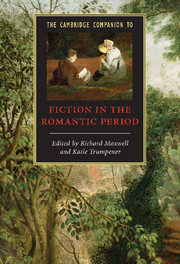Book contents
- Frontmatter
- Introduction
- 1 The historiography of fiction in the Romantic period
- 2 Publishing, authorship, and reading
- 3 Gothic fiction
- 4 The historical novel
- 5 Thinking locally: novelistic worlds in provincial fiction
- 6 Poetry and the novel
- 7 Orientalism and empire
- 8 Intellectual history and political theory
- 9 Women writers and the woman’s novel: the trope of maternal transmission
- 10 Tales for child readers
- 11 Sentimental fiction
- 12 Fiction and the working classes
- 13 The Irish novel 1800-1829
- 14 Scotland and the novel
- Further reading
- Index
- Series List
12 - Fiction and the working classes
Published online by Cambridge University Press: 28 January 2009
- Frontmatter
- Introduction
- 1 The historiography of fiction in the Romantic period
- 2 Publishing, authorship, and reading
- 3 Gothic fiction
- 4 The historical novel
- 5 Thinking locally: novelistic worlds in provincial fiction
- 6 Poetry and the novel
- 7 Orientalism and empire
- 8 Intellectual history and political theory
- 9 Women writers and the woman’s novel: the trope of maternal transmission
- 10 Tales for child readers
- 11 Sentimental fiction
- 12 Fiction and the working classes
- 13 The Irish novel 1800-1829
- 14 Scotland and the novel
- Further reading
- Index
- Series List
Summary
This title could mean fiction that interested the working classes, in the related senses engaged the attention of and addressed the material interests of. It could also mean fiction that represented the working classes, in the overlapping senses depicted and spoke for. There were at least five kinds of fiction circulating during the Romantic period that interested or represented the working classes. There was fiction by and for them, fiction by but not particularly for them, fiction for but rarely by them, fiction by and for the middle classes but read by some working-class people, and fiction depicting the working classes but written by and for the middle classes. There was a little of the first and second, much of the third, some of the fourth, and a good deal of the fifth. Literature being mainly a middle-class cultural institution, the last has received most attention; in fact, some have argued that middle-class fiction, whether or not it represents/depicts the working classes, can nevertheless represent/speak for them. Most have also assumed that fiction read predominantly by the working classes could not represent their interests, being mere commercial entertainment with little artistic or intellectual value, drugging its “consumers” with escapist fantasy, concealing their exploitation from them, and distracting them from their real political interests. Such fiction may, however, have its own artistry, ideology, and politics. Investigating this possibility requires turning from the poetics of middle-class literature to those of working-class print culture, from authorship to reading, from “original” to recycled texts, from history of texts to history of books, from literary criticism as disciplined or “schooled” reading for professional purposes to unschooled but not unskilled reading for everyday life.
- Type
- Chapter
- Information
- The Cambridge Companion to Fiction in the Romantic Period , pp. 207 - 234Publisher: Cambridge University PressPrint publication year: 2008
- 5
- Cited by



